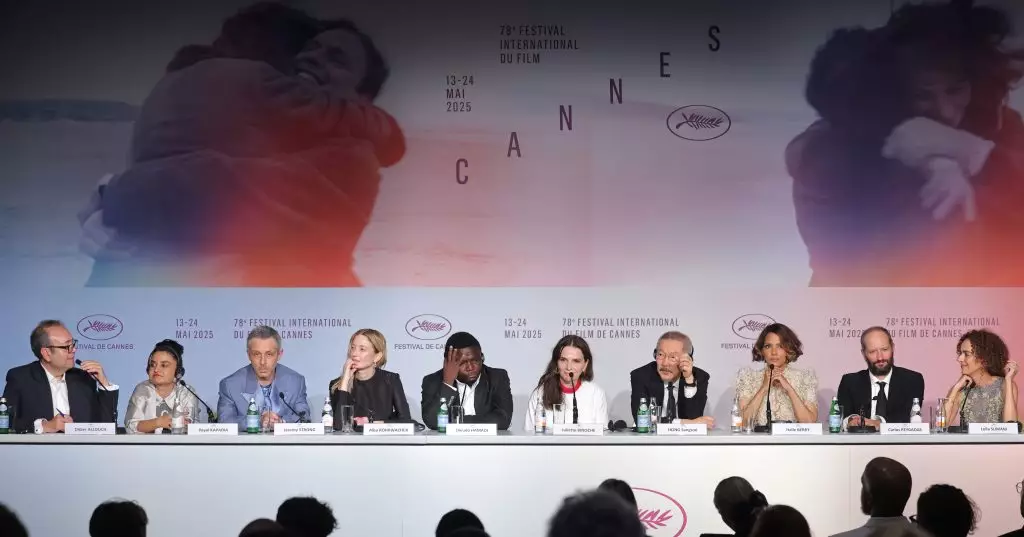The prestigious Cannes Film Festival is often rife with unexpected moments and shockwaves of emotional resonance, but few have been as profound as the awarding of the Palme d’Or to Iranian filmmaker Jafar Panahi for his film *It Was Just an Accident*. The decision came as a delightful turn of events for many spectators and industry insiders, with Jury President Juliette Binoche highlighting the film’s essence as grounded in themes of resistance and survival, crucial elements in today’s tumultuous socio-political landscape. The Academy Award winner’s words weren’t simply the accolade of an established artist; they were a clarion call emphasizing that art serves as both a lens through which we examine our darkest struggles and a beacon of hope guiding us toward understanding.
Art as a Reflection of Reality
Film, particularly in the hands of a director as poignant and politically acute as Panahi, serves not merely as entertainment but as a vessel for social commentary and a reflection of human experience. The narrative of *It Was Just an Accident* centers around a group of marginalized individuals wrongfully accused and subjected to torture—an echo of Panahi’s own tribulations within a repressive regime that has imprisoned him. When Binoche articulated her belief that Panahi’s cinematic output embodies the struggle against indignities inherent in modern life, she was shedding light on a wider discourse surrounding freedom and artistic expression. It is imperative to acknowledge that cinema can bridge the gap between personal suffering and collective human experience, providing a medium that feels deeply relevant and necessary.
Empowering Messages in a Turbulent Era
The pressure cooker of societal unrest invades our collective consciousness today, seeding fear and cynicism wherein empathy ought to flourish. Binoche urged film enthusiasts and creators alike to leverage their art as a medium for change, fostering not only awareness but a transformation of dialogue—towards kinder narratives that resist the innate human instinct for retribution in the face of violence. “We must think differently, recognizing the humanity within each other,” she contended, underlining an essential point: if we fail to cultivate a deeper sense of understanding and provide space for healing, we undermine our humanity.
Such sentiments resonate profoundly in contemporary culture, where the tantalizing cycle of revenge often seems irresistible. But Panahi’s film suggests that there exists a path beyond the quagmire of revenge—one that carries the potential for dialogue, healing, and ultimately, hope. The narrative’s pivot from vengeance to understanding calls for a paradigm shift that acknowledges the moral complexities of human actions.
The Role of the Jury and the Creative Community
The gravity of the jury’s decision to award Panahi at Cannes speaks volumes about the role of cinema in shaping societal narratives. In their discussions, Jury members touched upon how films have the power to transcend mundane storytelling, turning them into evocative commentaries that resonate with their audiences. Actor and juror Brian Strong remarked on the idea of art as a proactive force against those who wield power unwisely. His insights illuminate the importance of recognizing compelling storytelling not just for its artistry, but for its capacity to spark change in societal attitudes.
Strong’s reflections, paired with Binoche’s ardent declarations of art as a guiding light amidst darkness, validate the festival’s commitment to uphold and foster diverse narratives. Cannes serves not only as a platform for showcasing artistic genius but as a dynamic space to ignite discourse—opening avenues for contemplation and transformation reflecting the essence of humanity.
Confronting Violence with Hope
When crisis surrounds us, we often dehumanize—seeing others only through the lenses of conflict and discord. Panahi’s work implores us to look beyond immediate responses fueled by hurt and anger. “The film stands as a reminder that beneath the layers of pain lie opportunities for collective growth,” Binoche indicated, reinforcing an essential truth: if we allow ourselves to listen and empathize rather than react impulsively, we cultivate a richer, more nuanced understanding of what it means to exist in a shared world.
*It Was Just an Accident* epitomizes Panahi’s deep resilience and capacity to produce art that resonates with humanity’s frequent failures—while simultaneously penning hopeful possibilities that speak directly to the power of healing through empathy and dialogue. In moments when the world seems dominated by narratives of despair, such stories serve as necessary reminders that amid our darkest trials, we can rediscover our shared humanity—a goal worth the relentless struggle to achieve.


Leave a Reply